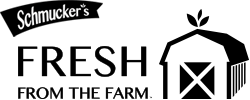Where are your partner farms?
We partner with numerous traditional Mennonite and Amish family farmers north and west of Kitchener-Waterloo. We've been in partnership together for 15-25 years.
- Our poultry comes from the Martin family, west of Elmira. In the summer, our son David and his family raise pastured chickens on their small farm north of Toronto.
- Pork comes from farms around the Floradale area and is processed by the Martin family in Floradale.
- Pastured eggs from the Zehr family are from a farm close to the village of Millbank.
- Our 100% grass-fed beef and our beef that is fed both grass and grain is from the Frey family north of Millbank.
- Lamb comes from the Jantzi family, west of Wellesley.
- Maple syrup is from the Burkhart family near Crosshill. Honey is from Baumans in Millbank. Our jams, pickles, juices, and spreads come from Wellesley and Elmira.
- Our Guernsey milk comes from the Eby family near St Jacobs. The herd has been in the family for five generations.
- Much in-season produce comes from many farms around Elmira and Aylmer.
- Nacho and Mimi at Reyes Farms, a sustainability-focused farm in Niagara, provide us with fresh fruit and some vegetables.
- Our canning and freezing of local fruits and vegetables is done on a farm near Dorking.
When is the meat butchered and processed?
The poultry is butchered on Wednesday each week. The beef is butchered at least two weeks previously and aged (as all top-quality beef must be), and then cut and packaged on Wednesday afternoon each week. The lamb is butchered five days before and aged, and then cut and packaged on Wednesday. Pork is butchered on Tuesday, then processed on Wednesday. Our refrigerated truck picks everything up at the farms Wednesday evenings.
Are the animals fed any growth hormones or antibiotics?
No! Our producers are not large operations, but rather small family farmers who use no hormones, drugs, or chemicals in feeding and raising the meat.
How are the animals raised? What are they fed?
None of our animals are locked up factory-style. They come from small family farms. Beef cattle are outside on pasture land all summer, and in the winter are in large pens where they have plenty of room and thick straw bedding. Hogs, while not outside, are in large pens where they have plenty of room to roam, and thick straw bedding.
Chickens are raised in a large open room where there is lots of room to walk around. The modern barn is also sealed, so it is impossible for a wild bird to get access. This is to ensure no exposure to avian flu. Our son David's chickens are outside on pasture. Lambs are in roomy pens with lots of straw bedding. They can go outside in the summer.
Our farmers feed the animals with grains and forages that they grow on their own land; or if they buy feed, it’s locally grown by their neighbours. They don’t buy commercial feed that has chemicals, processed filler, and other questionable ingredients.
More specifically, beef cattle are fed hay, corn, and soybeans. They also get pasture grass in summer and some oats and barley when very young. If the meat is labelled 100% grass-fed, it means the animal ate hay, hay, and only hay, plus pasture grass in the summer. Pigs are raised on corn and at times a bit of barley. Chickens eat flax, barley, corn, and soybeans. Turkeys are fed barley, corn, and soybeans. The lambs are given barley, corn, some oats, and a bit of hay.
Is ordering in advance required?
No. You can come to our store with your shopping list anytime. However, for specialty products—specific cuts of meat, for example—it is better to order in advance to ensure availability. Advance ordering is highly recommended at Thanksgiving, Christmas and Easter.
Can you special-order things that I want that you don’t normally stock?
Yes! For special cuts of meat, we only need a week advance notice. For any other items, ask us! We will do our best.
What about food safety inspection?
A government inspector is always present at the abattoir to inspect and approve all animals and carcasses. Plus, all our butchering is done at government-inspected and -approved facilities.
Are the kitchen facilities where you prepare homemade meals government inspected?
Yes. Our kitchen is in the basement of our store and is inspected by the City of Toronto Health department on a regular basis. In addition, our chef Maame and other team members have taken "Food handling safety" courses.
What happens if I’m not happy with something I buy at your store?
Tell us immediately and bring the product back and we will exchange it, give you a credit, or refund your purchase.
